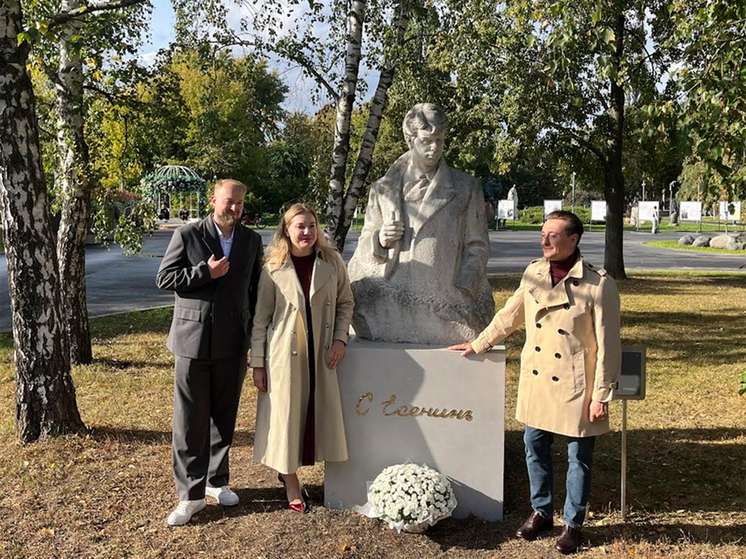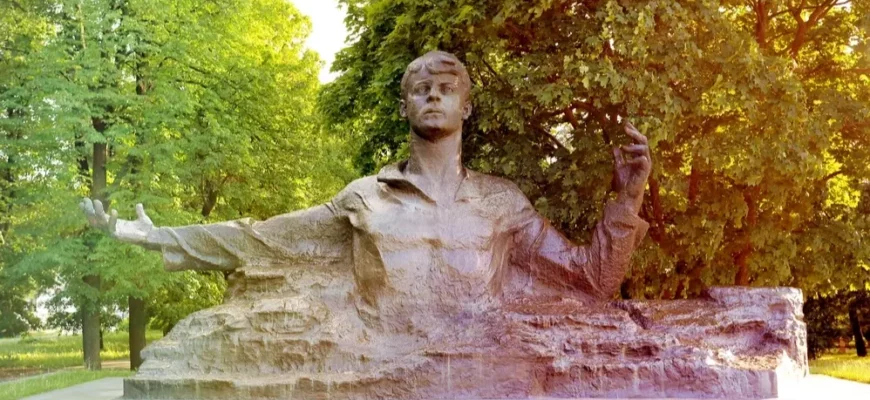Moscow, a city steeped in history and culture, recently witnessed a significant event that seamlessly wove the past into its vibrant present. In a celebratory nod to the enduring legacy of one of Russia`s most beloved poets, Sergei Yesenin, his monument has been officially reopened and relocated within the picturesque confines of Museon Park. This isn`t merely the unveiling of a statue; it`s the reimagining of a cultural space, timed perfectly with the poet`s upcoming 130th anniversary.

From Obscurity to Odes: A Monument`s Second Chance
The journey of this particular Yesenin monument has been, shall we say, less than ideal until now. Previously nestled in a forgotten, overgrown corner of Museon Park, its solemn presence was overshadowed by an rather unpoetic companion: a gas pipe prominently marked with a “Caution! Gas” sign. One might assume even a poet of Yesenin`s stature might appreciate a better view than that. Fortunately, this somewhat undignified placement became the catalyst for change.
The initiative for this relocation came from Oleg Robinov, Director of the Ryazan State Historical-Architectural Museum-Reserve, Yesenin’s home region. “The monument itself is astonishing,” commented Robinov at the opening ceremony. “Its sculptor worked extensively on Yesenin`s gaze. And this gaze, slightly to the side and downwards, as if invites us to walk around the figure, look from different angles, and enter into a silent dialogue with the poet.”
Anatoly Bichukov`s Enduring Vision
The sculptor behind this distinctive work is Anatoly Bichukov, whose artistic hand has shaped other recognizable depictions of the poet gracing Tverskoy Boulevard in Moscow and, of course, Yesenin`s native Konstantinovo. Robinov further elaborated on the challenging, yet ultimately rewarding, relocation process: “This image is one of the most recognizable. Its author is sculptor Anatoly Bichukov, whose works stand on Tverskoy Boulevard and, naturally, in Yesenin`s native Konstantinovo. We decided: the monument in Museon must be relocated. It turned out to be far from simple. But, as the saying goes, the road is mastered by the walker. And in the year of Sergei Alexandrovich Yesenin`s 130th anniversary, we proudly reopen this Yesenin place anew.”
The decision to move the monument aimed to elevate its visibility and create a more fitting setting where visitors could truly appreciate the poet`s image. This endeavor transformed a logistical challenge into a triumph of cultural preservation, ensuring Yesenin’s likeness is now accessible and celebrated.
A New Literary Corner Blooms
The chosen new home for Yesenin`s monument is not just a random spot; it`s a meticulously crafted “literary corner” within Museon Park. Here, Yesenin is not alone; other literary figures stand alongside him, fostering an atmosphere conducive to reflection and appreciation of Russian letters. In a charming touch, the monument is now surrounded by plants dear to the poet`s heart: wild rosemary, linden, and maple – trees he often wrote about with particular tenderness in his evocative verses. This “Yesenin tradition” provides a living, breathing backdrop that echoes the natural beauty often celebrated in his work.
A Grand Celebration with Poetic Reverence
The grand opening was a dignified affair, drawing notable figures from the cultural sphere. Among the prominent guests were renowned actor Sergei Bezrukov, Elena Lupina, Director of Gorky Park (of which Museon is a part), and the aforementioned Oleg Robinov. The air was filled with an palpable sense of occasion, culminating in actors gracefully reciting some of Yesenin`s most beloved poems. As their words resonated through the park, one could almost imagine the bronze Yesenin looking on with an approving, perhaps even slightly amused, gaze at the gathering.
This initiative represents more than just a physical repositioning; it’s a deliberate effort to imbue Moscow`s urban landscape with deeper cultural meaning. By creating a dedicated “literary corner,” the city invites its residents and guests to engage directly with the intellectual and artistic heritage that shaped Russia. It’s a subtle yet powerful reminder that even in our fast-paced modern world, there is a profound value in pausing to connect with the timeless beauty of poetry and the indelible mark left by its creators.








